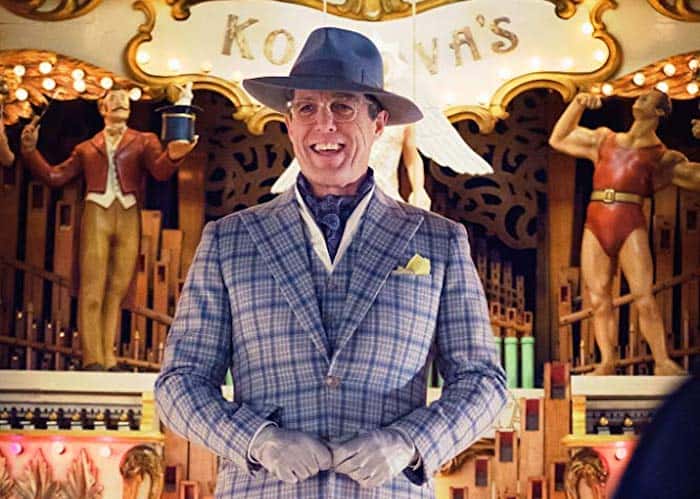This article is part of our Villains Week series.
Paddington 2 has found a loyal following among adults for a host of reasons: the delightful visuals, the apt allegory for immigration, the sincerity that could warm even the coldest hearts. In his first villainous role, Hugh Grant’s portrayal of the struggling actor turned thief Phoenix Buchanan is also high up on that list. The main focus of Paul King’s much-beloved 2017 Paddington sequel is obviously the well-mannered CGI talking bear, but as is the case with many children’s movies, the lighthearted villain often has some real substance hidden beneath the surface.
So what type of villain is fit to challenge Paddington Bear’s powerful force of pure moral virtue, sweetness, and marmalade? Thanos and the Joker would be out of place in the straight-laced Paddington universe but Phoenix Buchanan provides cutting social commentary on their level, holding a mirror up to the audience to examine our egotism. Buchanan is the antithesis of everything Paddington stands for, putting in stark relief the corruption and self-obsession at the heart of modern life.
Mrs. Bird (Julie Walters) warns that actors are especially devious because “they lie for a living.” It only takes a few minutes of watching the news to realize actors aren’t the only ones. Buchanan’s status-obsessed villainy is more than just a foil to Paddington’s integrity, his delusions repackage the common cautionary tale about greed for the internet age. Between the ever-changing collection of disguises and the intense longing to succeed, he reflects the perils of social media narcissism and the powerful pull of the internet scam.
The internet loves stories about prolific scammers almost as much as we enjoy rooting for awful characters and reveling in their inevitable downfall — just watch an episode of Succession or Breaking Bad, or stumble into an article rabbit-hole about Anna Delvey or Elizabeth Holmes. In the process of ruthlessly climbing to the top of the social ladder, everyone becomes a villain. In Paddington 2, the villain’s origin story falls somewhere between a selfish desire to find a lost treasure and a deeply human desire to just regain some lost dignity.
There’s no lack of self-absorbed villains out there; in fact, it’s probably the number one shared villain trait besides straightforward cruelty. Buchanan’s desperation and insecurity are palpable as he tries to rebound his acting career from dog food commercials back to the stages of the West End, and it’s his ambition combined with delusions of grandeur which propel the plot forward.
Paddington washes the neighbors’ windows to save money for a pop-up book of London for Aunt Lucy’s birthday present, while Buchanan takes the first opportunity he can find to utilize his costume stash to not only steal the pop-up book but also sneak around London landmarks in various disguises. The moral takeaway for the intended audience of children probably stops at “stealing is bad.” However, in the context of post-truth politics and social media, the lengths Buchanan’s ever-changing identities will go to regain his status as an actor encapsulates the destructive promise of fame, self-absorbed online culture, and the impact of unchecked greed on individuals and communities in its wake.
The most memorable aspect of Grant’s performance is the many disguises, including a nun costume that reveals to a priest’s robes and a Macbeth outfit to which he directs his monologues. Performing many identities is even easier online, no costumes required. The internet requires much less effort to impersonate others and spread deceptive information, making it much simpler to scam and steal. Though as Paddington’s imprisonment illustrates, when greed is involved, lies usually cause collateral damage for those caught in their path.
Paddington 2 ultimately resonates not only because of Paddington’s lawful good, but its interactions with Buchanan’s chaotic yet familiar evil. Children’s movie villains can often feel like caricatures, whereas Buchanan’s charismatic deception, grift, and willful indifference feels very real in the context of our self-absorbed online culture. In everyday life and compared to many villains, the banality of selfishness is less shocking but more effective, only exposed as truly cruel due to Paddington’s utter blamelessness.
Compared to the first Paddington film’s villainous taxidermist Millicent Clyde (Nicole Kidman), Buchanan is somewhat redeemable only because of how his propensity for lying, stealing, and general disregard for other people (or bears) is socially acceptable if one wants to succeed. And I’m guessing Paddington forgives him. Like the icon he is, Buchanan redeems himself and fulfills his dream through a post-credits musical number in prison (as all villains should!) With the help of a “captive audience,” he finally stages the comeback show he strived for all along, allowing his heart to finally grow three sizes like the Grinch. I would like to see Joaquin Phoenix’s Joker show that kind of range!

